
By creating a healthy ecosystem, Hero MotoCorp has brought in upward mobility and joy to many communities
Safeguarding Happines
HERO
Among the leading automotive companies in India, Hero MotoCorp endeavours to create harmony between man, machine and Nature. With the principle of 'Manufacturing Happiness', its CSR strategies focus on enhancing environmental capital, supporting rural development and education, facilitating healthcare, creating sustainable livelihoods and promoting sports and road safety awareness. Under the ‘We Care’ umbrella, the conglomerate has five programmes–Happy Earth, Ride Safe India, Hamari Pari, Educate to Empower and Community Development—which fulfill its vision of a ‘greener, safer and equitable world’

Girls are given two-wheeler driving training under Ek Pahal
With an ever-increasing demand for vehicles, road safety becomes an essential component. Carelessness on the road leads to many road tragedies. To prevent mishaps and encourage safe driving, Hero MotoCorp has been actively working with the traffic police in several states to conduct Ride Safe training programmes. The company works in association with the government and adopts traffic parks in the respective states to inculcate road safety awareness measures.
The company’s two-wheelers are used for training purposes as
well, as the primary aim is to equip two-wheeler drivers. Basic
riding including riding posture, braking technique, riding on a
bumpy/rough road to balancing on a narrow road and more has been taught at these
Traffic Safety Parks. The students
learn all these under three different types of programmes–
Ride Safe Programme (RSP), Ride Safe Awareness
Programme (RSAP) and Learn to Ride (LTR). There are
short to long courses, ranging from a day-long one to a
five-day one. Over 6,00,000 participants have benefited
through the road safety initiative.
Hero MotoCorp also organises regular
road safety
awareness campaigns, sensitises school children and
manages road safety communities. In fact, Team Ride Safe
India has established Road Safety Clubs in over 1,150
schools. Encouraging active participation, the company
felicitates good drivers through Project ‘Be a Road Hero’.
This helps in bringing about a technical and behavioural
shift that leaves a long-term impact and brings down
mortality and accident rates.

Water reservoirs have been built, solar street lamps help at night
As the name suggests, this flagship programme has a larger objective of bringing about cumulative environmental changes and make planet Earth a happier place to inhabit— for the present as well as future generations. Under Project Hero Green Drive, the company focusses on tree plantation and afforestation. The project has brought about a significant increase in green cover with the plantation of over two million trees and the regular monitoring ensures survival of trees.

Water reservoirs have been built, solar street lamps help at night
All projects undertaken under Happy Earth are complementary in nature and help in mitigating environmental degradation and also the effects of climate change and global warming. With climate change taking a toll on the planet, Hero MotoCorp has been working on renewable and green energy. Under Project Aarush, it has installed a total of 19,932 solar street lights in villages of Rajasthan, Haryana, Gujarat and Uttrakhand. “Well lit streets make it so convenient for everyone, especially young children and women. These solar lights ensure safety and people can step out without fear,” says Sumitra Devi, Sarpanch, Village Bastpur, Pataudi District.

solar panels are part of green energy
The company has also constructed water reservoirs in village Bastpur and adjacent villages. Sumitra Devi says, “The villages used to depend on boring wells earlier. But that is not allowed now as ground water level has gone down a lot. To recharge ground water, the company has created a system where all the water (other than the sewer) goes to the reservoir. We have added fishes and turtles in this, as they keep the reservoir clean. We use this for household washing and cattle.”

Good science labs encourage students to attend school
Creating an ecosystem where the children
are motivated to study, the
company has provided good infrastructure to 200+
schools in Dharuhera,
Gurugram, Haridwar, Neemrana, Jaipur and Halol under Project
Shiksha. This benefited close to 4.15 lakh students. The idea is to find
innovative solutions to improve quality of education and learning
outcomes.
Talking about the facelift, Principal, Government Senior
Secondary
School, Kapriwas, Rewari district, says, “The work started with basic
painting and white-wash. With the company’s help, we have furniture,
fans, lights in each classroom. We now have a solar power system and
the electricity consumption has come down. The science labs are
equipped with microscopes and other necessary items.
The digital
connection has gone up with new computers and tablets. The company
has helped our school a lot. We had 100 per cent result in 2019 for class
XII. The dropout rate has decreased and even the teacher’s attendance
is better.”
The colourful walls with motivational thoughts are pleasing and
engaging. “There was no separate toilet for girls earlier. But now there
are toilets for girls and boys. The company went ahead by constructing
toilets in senior and junior wings. This has helped increase student
strength,” adds the Principal.
The students are pleased with the Swachch
Vidalaya initiative and
other modern facilities. “I have been studying in this school for more
than five years and I see the difference. It feels like any other private
school with good facilities. My parents are also happy. When you get
such a nice environment, you feel motivated,” says Rakesh, who is
studying in class X.
The initiative also supports anganwardis in the rural
belt of Halol, in
Panchmahal district of Gujarat, as well as Rewari and Gurugram districts of
Haryana, besides the government middle and senior
secondary schools. “The company has been supporting us a lot. Our
anganwadi is now vibrant and has dedicated play area for children. A lot
of women are part of some SHG. They leave their children here when
they go out for work. They are assured that the children are well taken
care of, and even the mid-day meal is provided,” says Manjulaben, a
gram panchayat member and anganwadi instructor at Madhwas village
in Halol.
Empowering the country digitally, the company has provided Tab Lab
and Smart Class facility to 20 schools in Gurugram and Rewari district
of Haryana. Smart classrooms with LED screens have been built in 10
schools. In another 10, tablets loaded with focussed content have been
provided.

Good science labs encourage students to attend school
Besides building the infrastructure, the company also helps students in senior classes with counselling for careers and further education. For talented ones needing support, there is a programme called Hero Talent Search. The programme involves identification of students from government schools who don’t have access to coaching opportunities for higher education. These remedial classes help in development of non-cognitive skills and create a secure learning environment for board examination. The plan is to motivate them to undertake professional courses in leading universities in the future. There is a screening test, interview, and certain qualifying marks as a selection criterion—the selected ones are then provided necessary coaching support in class IX & X. Khushi stays close to the centre and as a recipient of this support, appreciates the programme. She says, “I’ve been coming to the centre for three years. My elder sister also used to come for the evening classes. We get a school bag, uniform and books. My favourite subject is maths and didi teaches it so well. She scolds me if I make silly mistakes. I want to score well in mathematics in my board exams. I am still in class VII but I have seen my sister preparing for her boards.”

coaching centres for talented students
Taking this a step forward, the conglomerate has a separate programme called Ek Pahal for women from rural and backward communities. It has partnered with Haryana Government and United Nations Development Programme for ‘Empowering Girl Child’ and teaches two-wheeler riding to girls studying at the Haryana-based Women Industrial Training Institutes (ITIs). There are 15 Ek Pahal centres in Haryana.

Mobile medical vans help villagers; clean toilets in schools for girls and boys
This one-if-its-kind project aims to
increase the mobility
and confidence of girls, empower them to be mobile for
work and personal requirements, thereby enhancing their
employability. In addition, the company is also providing
two wheelers and equipment such as helmets, safety gear,
and gloves to girls who perform well. The government is
supporting this initiative by providing logistics and
infrastructure support and facilitates linkages with RTOs
for learners’ licenses to the successful trainees. Geeta R
Singh, Principal, Women ITI, Gurugram, says, “This training
has helped my students a lot, as they can now commute
easily in and around the city for their work. Most of them
didn’t know how to ride a bicycle and now they can ride a
bike. The mindset in the society is also changing as this is
helping them professionally. They are learning skills at ITIs
and if they want to pursue further, this driving skill will
facilitate in terms of independence and being responsible.
They are more confident and efficient now.”
More than 5,000 girls have been trained under the Ek
Pahal initiative for two-wheeler riding training.
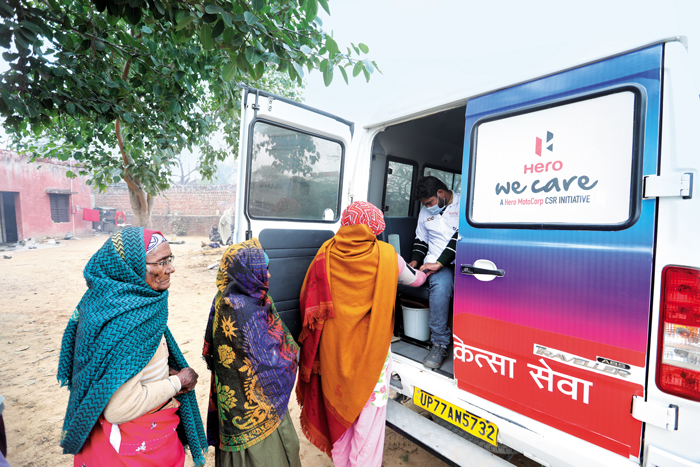
Good science labs encourage students to attend school
Preventive healthcare is an integral part of the CSR strategy. Under Project Arogya, Hero MotoCorp offers mobile healthcare facilities in rural belts of Haryana, Gujarat, Rajasthan and slums of Delhi benefiting over a lakh people in a year. With a doctor and an attendant, the van travels to many locations through the month. The villagers are notified in advance. The company’s resource people and village pradhan are the key people to take this initiative forward. A general check-up includes checking the blood pressure, sugar levels, haemoglobin and eyesight. The van is equipped with medicines and has proper sitting facility, especially for senior citizens.
“We have a weekly schedule and go to two to three villages
a day, depending on the population there. Usually the
medical van stays parked at the central location of the
village for 3-4 hours. Mostly senior citizens, women with
their children come for their check-ups. The most common
ailments are viral, mild fever, BP, flu, sometimes upset
stomachs. For any major problems, they are referred to a nearby hospital,” says
the physician with the Hero MotoCorp medical
van in Pataudi.
Rambhuvan works at a construction site in Halol, Gujarat,
and is
grateful for this facility. “I work as a mason here. I have come from
Bihar. As there is dust and cement all around, I get skin rashes
regularly. I also suffer from cough and cold. The medical van comes
every Monday for a few hours. I come for the check-up and the free
medicines regularly. I am a daily wager and don’t earn enough to go
to a paid clinic. I need to send money to my family in Bihar as well.

Through Self-Help Groups, women are given livelihood training such as snack-making
Creating livelihood opportunities empowers everyone. It gives them the financial independence and support to rise above restricting circumstances. With this aim, Project Jeevika focusses on skill development. In villages such as Madhwas and Maswad near Halol, Gujarat, the company has collaborated with Setco Foundation to create Self-Help Groups (SHG), comprising 10 or more women in each group. These SHGs are equipped with different skills such as making healthy snacks, tailoring, tie-and-dye techniques, detergent making, sanitary napkin making and more. These skills equip them for regular income and the women learn to support each other. The SHGs are also linked to government initiatives such as Mission Mangalam for advanced skill development.
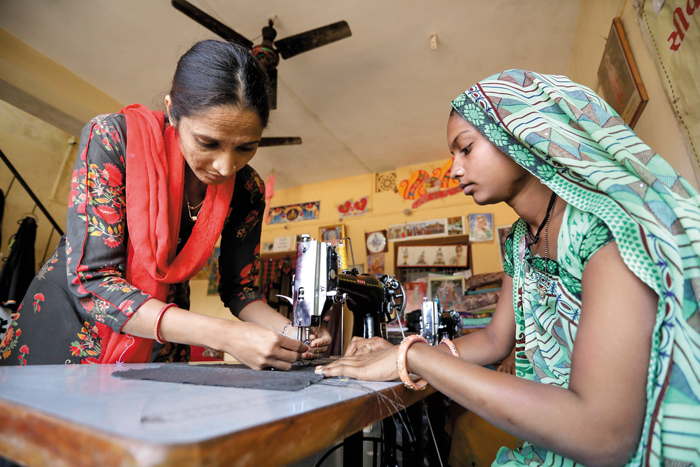
Through Self-Help Groups, women are given livelihood training such as snack-making and tailoring
Not just skilling and creating a network,
the groups are also linked
to the markets. The company helps then connect to anganwadis,
corporates who buy nutritious snacks such as sukhdi, traditional
rotla, phoolwadi from them for breakfast and mid-day meals. The
SHGs also cater to corporates in Halol where they send packed food.
The
company has also put in place an initiative in partnership with
the United Nations Development Programme. Through this, they
empower women by sharing information about their economic
rights and guide them to start their enterprises. Around 60,000 women from
Sonipat, Mahendragarh, Rewari, Charki Dadri, Jhajjar,
Bhiwani and Rohtak districts of Harayana have been guided. This
training was done in a period of 24 months about various
entrepreneurship and business start-up opportunities. Start-up
training is also being given to another 5,000 women, out of which
3,500 counselled and guided to start their new enterprises within the
project timeline.
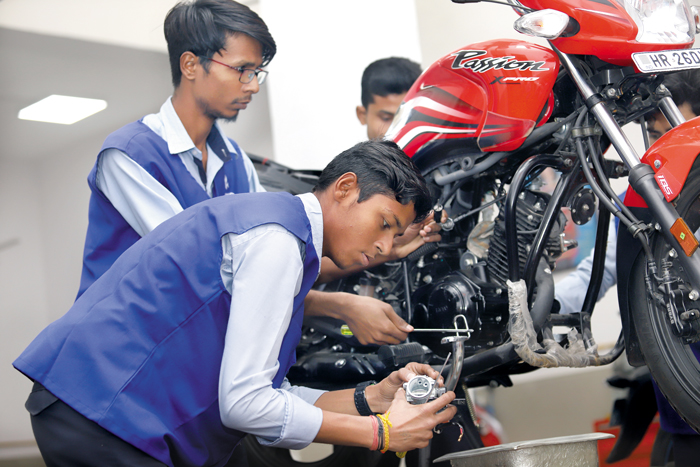
Youth are supported with vocational training in two-wheeler repair
Catering to different skilling needs, in Delhi’s Arab Ki Sarai at Nizamuddin, Hero MotoCorp has set up a Centre of Excellence at the Government ITI. It has provided the necessary infrastructure for those who are keen to become two-wheeler technicians. This is equipped with a fully automated workshop with pneumatic tools, precision equipment, live cut sections of Hero engines and other parts. The first batch of 30 students joined in October 2019 and is learning the two-wheeler technician course.
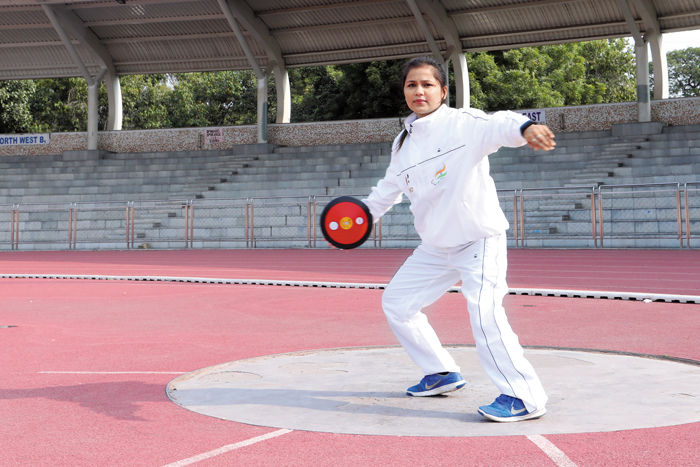
Through Self-Help Groups, women are given livelihood training such as snack-making and tailoring
Promoting sports culture, Hero MotoCorp has developed sports infrastructure in more than 50 schools, supported 2,535 athletes including paralympic athletes. The company supported all Indian players of Asian Para Games 2018 under Project Enable. Athletes with cerebral palsy, bilateral polio or loss of both legs below the knee and other such disabilities were the participants of Asian Para Games 2018. Neeraj Yadav was stricken by polio at birth and has been on a wheelchair since. He won the gold for javelin at Asian Para Games 2018. “I started playing from 2015. I used to play wheelchair lawn tennis and represented India too. But then I was introduced to para sports and I started playing shot put, discus throw and javelin throw. I have never felt disabled, thanks to the support provided by my coach and the facilities given by Hero MotoCorp. Para athletes need a different diet. We need a trainer and a helper as well, so the expenses are high. And such aid helps us in participating in championships.”
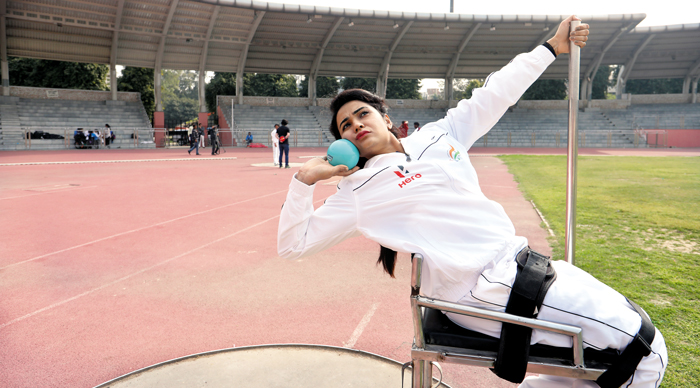
Nidhi Mishra was diagnosed with Retinitis Pigmentosa, a genetic and progressive disorder, early. She studied in a regular school initially, but as her vision deteriorated, she shifted to a special school. “I wanted to become a pilot and used to play badminton. But due to loss of vision, everything became challenging. But I stuck on and turned to para sports. I have been into athletics for more than a decade now. My main sport is discus throw. Complementary events are shot put and 100-metre running in track and field category, which is for totally visually impaired athletes. I won a bronze for discus throw at Asian Para Games 2018 and another medal at a world championship in 2019. I’m preparing for the Tokyo Olympics and have qualified for discus throw. But I need to improve my ranking to get into the quota and am working on that.”
Hero MotoCorp has provided prosthetic limbs
along with joboriented livelihood training to many specially abled ones. More
than
6,968 disabled individuals benefited through surgery, artificial limbs
and crutches
The wheels of support never stop rolling for this conglomerate
as
sustainable development is the goal.




